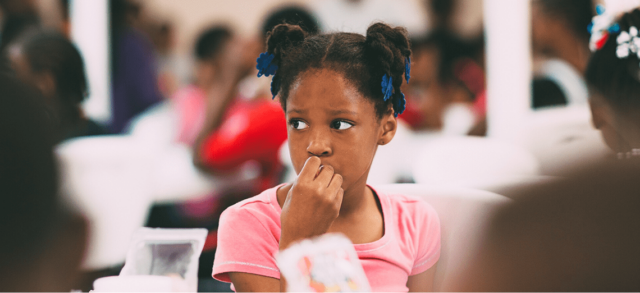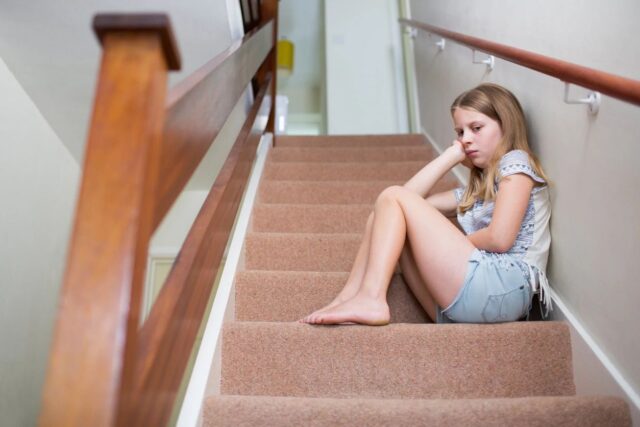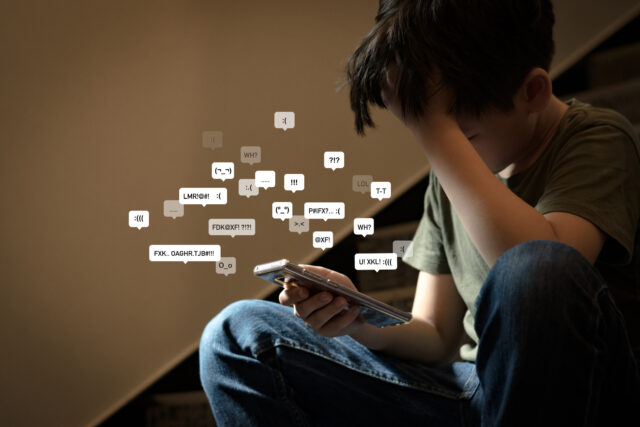Early symptoms of bipolar disorder include changes in energy level (more hyper than usual or suddenly low energy), needing less sleep, periods of high excitement or irritability, talking faster than usual, and having racing thoughts.
Early Signs of Bipolar Disorder in Teens
Catching the disorder before full onset improves outcomes
Clinical Expert: Anna Van Meter, PhD
Key Takeaways
-
Recognizing the early warning signs of bipolar disorder — known as the prodrome — in teenagers can help families intervene before a full-blown episode occurs.
-
Symptoms like sleep changes, energy shifts, irritability, and racing thoughts, while subtle, can signal the emergence of bipolar disorder, especially in teens with a family history.
-
Early treatment, usually including therapy to reduce stress and regulate sleep, can delay or lessen the severity of bipolar disorder, offering kids a better long-term outlook.
When people hear “bipolar disorder,” they think dramatic mood swings or someone suddenly spiraling into mania. But what if we could catch the signs before a full episode hits? That’s the promise of understanding of what is called the bipolar prodrome — the early warning phase that shows up in many kids and teens long before a formal diagnosis is made.
Why try to spot these early signs? Because helping kids before the disorder disrupts their lives can actually delay onset and reduce the severity of the disorder. “The earlier we can intervene, the better the outcome,” says Anna Van Meter, PhD, a clinical psychologist and researcher at the NYU Child Study Center.
Full-blown bipolar disorder causes extreme changes in mood, energy, and behavior — periods of feeling unusually happy, irritable, or energetic (mania), followed by times of deep sadness, fatigue, or withdrawal (depression). Until relatively recently, little was known about how to identify the symptoms that came before the first manic or depressive episode.
“Ten years ago, we didn’t talk about the bipolar prodrome,” says Dr. Van Meter. “Now, we’re studying it, we’re developing interventions, and we’re helping families earlier. That’s huge.”
What is the bipolar prodrome?
Think of the prodrome as the “early signs” phase. It’s a period when a young person might be showing hints of bipolar disorder, but they don’t yet meet the full criteria for a manic or depressive episode. Dr. Van Meter puts it this way: “The bipolar prodrome is a time when kids or teens might have changes in energy, mood, or thinking, but it’s not enough to qualify as a full mood episode. These changes might seem small or fleeting, but they’re important to notice.”
Most of the time, these early signs show up in adolescents, though they can sometimes start even earlier. “Bipolar disorder is really uncommon in young children,” Dr. Van Meter explains. “But by the time kids hit puberty, we start to see more signs — especially in those with a family history. We know that bipolar disorder is a very heritable illness.”
She also emphasizes that it’s not just about recognizing individual symptoms but the way they evolve over time: “We’re not just looking for one behavior that stands out — we’re looking for patterns across weeks or months that don’t quite add up. That’s where the prodrome hides.”
What early signs should parents watch for?
What makes the prodrome especially challenging is how sneaky it can be — the symptoms tend to be subtle and easy to chalk up to typical teen moodiness or stress.
Here are some of the most common signs:
- Changes in energy: More hyper than usual or suddenly low energy
- Sleep issues: Trouble falling asleep or needing less sleep without feeling tired
- Mood shifts: Periods of high excitement or irritability that don’t quite cross into mania
- Changes in speech: Talking more or faster than usual
- Changes in concentration: Being easily distracted or having racing thoughts
The prodrome can be hard to notice if you’re not looking for it. “It starts slowly,” says Dr. Van Meter. “Maybe your kid is sleeping less or seems more energized at night. Maybe they’re talking more or acting impulsively. These little changes add up.” Dr. Van Meter encourages parents to trust their gut. “Parents know their kids best. If something feels off — even if you can’t put your finger on it — trust that instinct and start tracking.”
Why are early signs hard to detect?
One word: overlap. A lot of the early symptoms of bipolar disorder look like other things — or just normal teen ups and downs.
Puberty also plays a big role in complicating diagnosis: “Hormonal changes can mimic mood symptoms,” says Dr. VanMeter, “and that makes it even harder to separate what’s clinical from what’s developmental.”
Family history can be a big clue. “If a parent or sibling has bipolar disorder, we pay extra attention to things like mood changes, energy shifts, or impulsivity,” she adds. “It doesn’t mean a child will develop bipolar disorder, but it raises the level of concern.”
Why early detection matters
Spotting signs early isn’t just about slapping a label on a child. It’s about getting ahead of the curve and helping kids before they are in crisis. Reducing stress and targeting good nutrition and, most important, consistent sleep can help delay the onset of illness — a run of not sleeping can actually trigger an episode of mania. “We can teach families how to manage stress, support healthy sleep, and notice when things might be heading in the wrong direction,” says Dr. Van Meter. “That can make a big difference.”
Research also supports the “kindling” theory — the idea that the more mood episodes someone has, the more likely they are to keep having them. “If we can help a young person avoid or delay their first full episode, that could really change the course of the illness,” she adds. Dr. Van Meter emphasizes the role of resilience, too. “We’re trying to build a buffer, help kids develop emotional tools before they’re in crisis. That’s not just preventive; it’s empowering.”
What treatments help?
Here’s the good news: There are effective treatments that can help during the prodrome — even before a child, usually a teenager, has been officially diagnosed with bipolar disorder. Psychoeducation is often the first step. “That means helping the child and their family understand what’s happening,” Dr. Van Meter explains. “We talk about symptoms, stress, sleep, and how to spot warning signs.” From there, many families benefit from therapy, especially family-based approaches. Some of the best evidence-supported options include:
- Family-Focused Therapy (FFT): Helps families communicate better, reduce conflict, and build routines
- Interpersonal and Social Rhythm Therapy (IPSRT): Focuses on building stable daily rhythms (like sleep, meals, and activities) to regulate mood
- Dialectical Behavior Therapy (DBT): Teaches emotion-regulation skills, which can be really helpful for teens dealing with intense mood swings
“We’re not necessarily trying to stop bipolar disorder from developing,” says Dr. Van Meter. “But we are trying to reduce the impact and help the child build skills early.” She also highlights the importance of tailoring therapy to the individual. “There’s no one-size-fits-all approach. We want to match the intervention to the child’s needs — and that takes ongoing monitoring.”
What about medication?
Medication isn’t always the go-to during the prodromal phase — and that surprises a lot of parents. Often, families expect that a prescription will be the first line of defense. But doctors typically start with therapy, education, and lifestyle changes instead, especially if symptoms aren’t severe yet.
Many parents ask, “Shouldn’t we be doing more?” But early on, building good habits and strong communication can be just as powerful — if not more so — than medication. In fact, medication is usually reserved for more severe symptoms or situations where safety is a concern. “If a teen is really struggling — if they’re showing clear signs of mania or severe depression — then yes, we might consider medication,” Dr. Van Meter says. “But for kids who are just beginning to show signs, we usually start with therapy and lifestyle changes.”
When meds are used, doctors might prescribe mood stabilizers like lithium or certain antipsychotics. But every case is different, and it’s important that decisions are made by a child psychiatrist who understands bipolar disorder in youth. Dr. Van Meter advises families to stay involved. “Parents should be part of the treatment conversation from day one. Meds can help, but they’re not magic — they work best when paired with structure and support.”
Can technology help?
It turns out there’s a silver lining to all that time your teen spends on their phone. Dr. Van Meter and her team are studying ways to use technology to catch mood shifts before they become full-blown episodes. The technology picks up on subtle changes in behavior before anyone notices them out loud. The new technology actually helps us understand mental health in real time — and for many parents, that kind of early heads-up could feel like a lifesaver. “We use something called digital phenotyping,” Dr. Van Meter explains. “Basically, we track data from a teen’s smartphone to look for changes in behavior. Are they sleeping less? Are they moving around less? Are they staying home more than usual? These little shifts can tell us a lot.”
The goal is to build a personalized “baseline” for each teen, then flag when things deviate. “It’s kind of like a Fitbit for mental health,” she says. “We’re not there yet, but the hope is that someday we can use this data to give families and clinicians a heads-up before a crisis. We’re trying to shift from reactive care to proactive care. Technology is one of the tools that can help us get there.”
What can parents do to help?
If you’re a parent worried about your child, the most important thing is to stay curious, stay connected, and don’t panic. Dr. Van Meter offers this advice:
- Learn the signs: “The more you understand about bipolar disorder and the prodrome, the better prepared you’ll be.”
- Track patterns: “Keep a simple mood and sleep journal. It helps you and your child see trends over time.”
- Prioritize sleep: “Sleep is huge. Even small disruptions can trigger mood changes.”
- Be open and supportive: “Kids do best when they feel heard and not judged. Keep the conversation going.”
- Find the right help: “Look for therapists or psychiatrists who understand early bipolar signs. You want someone who knows what to watch for.”
And finally: “Don’t wait for a full-blown episode to act,” Dr. Van Meter urges. “If you notice changes, talk to your child, track what you see, and connect with a professional. That early action can really change the trajectory. Early support doesn’t just reduce suffering — it builds confidence. It shows kids they’re not alone and that help is available.”
Frequently Asked Questions
Signs that someone is developing bipolar disorder include being more hyper than usual, needing less sleep, periods of being highly excited or irritable, and talking faster than usual.
Early bipolar symptoms start slowly and can look like other things — or just normal teen ups and downs. Maybe the teen is sleeping less or seems more energized at night. Maybe they’re talking more or acting impulsively. These little changes add up.
Treatment cannot prevent someone from developing bipolar disorder, but it can delay onset and significantly reduce the severity of symptoms. Therapy involves working with the child and the family to help them understand what is happening, how to spot warning signs, and reduce the stressors that can trigger an episode. Evidence-supported therapies include Family-Focused Therapy (FFT), Interpersonal and Social Rhythm Therapy (IPSRT), and Dialectical Behavior Therapy (DBT).
References
The Child Mind Institute publishes articles based on extensive research and interviews with experts, including child and adolescent psychiatrists, clinical psychologists, clinical neuropsychologists, pediatricians, and learning specialists. Other sources include peer-reviewed studies, government agencies, medical associations, and the latest Diagnostic and Statistical Manual (DSM-5). Articles are reviewed for accuracy, and we link to sources and list references where applicable. You can learn more by reading our editorial mission.
-
Luby, Joan L., Mini Tandon, and Andy Belden. “Preschool Bipolar Disorder.” Child and Adolescent Psychiatric Clinics of North America 18, no. 2 (2009): 391-403, ix.
http://doi.org/10.1016/j.chc.2008.11.007 -
Luby, Joan L., and Neha Navsaria. “Pediatric Bipolar Disorder: Evidence for Prodromal States and Early Markers.” Journal of Child Psychology and Psychiatry 51, no. 4 (2010): 459-71.
http://doi.org/10.1111/j.1469-7610.2010.02210.x -
Shaw, Jon A., Janice A. Egeland, Jean Endicott, Cleona R. Allen, and Abram M. Hostetter. “A 10-Year Prospective Study of Prodromal Patterns for Bipolar Disorder Among Amish Youth.” Journal of the American Academy of Child and Adolescent Psychiatry 44, no. 11 (2005): 1104-11.
http://doi.org/10.1097/01.chi.0000177052.26476.e5 -
Van Meter, Anna. “Assessing Bipolar Disorder in Children and Adolescents.” The Carlat Report, October 18, 2021.
https://www.thecarlatreport.com/articles/3552-assessing-bipolar-disorder-in-children-and-adolescents
Was this article helpful?
Related Reading
-
 Bipolar Disorder: Why It’s Often Misdiagnosed
And how behavioral treatment, along with medicine, improves outcomes
Bipolar Disorder: Why It’s Often Misdiagnosed
And how behavioral treatment, along with medicine, improves outcomes
-
 Is It ADHD or Bipolar Disorder?
Diagnosing children who may have bipolar disorder can be very difficult because there is symptom…
Is It ADHD or Bipolar Disorder?
Diagnosing children who may have bipolar disorder can be very difficult because there is symptom…
-
 Identifying Mania in Kids and Teens
How to help your child if they are having a manic episode
Identifying Mania in Kids and Teens
How to help your child if they are having a manic episode
-
 Bipolar Test for Kids and Teens
Our free Symptom Checker can help you determine if your child might have bipolar disorder
Bipolar Test for Kids and Teens
Our free Symptom Checker can help you determine if your child might have bipolar disorder
-
 Complete Guide to Substance Use + Mental Health
When children are struggling with both a substance use disorder and a mental health disorder,…
Complete Guide to Substance Use + Mental Health
When children are struggling with both a substance use disorder and a mental health disorder,…
-
 Quick Guide to Bipolar Disorder
Bipolar disorder is a mental health disorder that causes cycles of extreme emotional changes. Children and teenagers with…
Quick Guide to Bipolar Disorder
Bipolar disorder is a mental health disorder that causes cycles of extreme emotional changes. Children and teenagers with…
-
 Family-Focused Therapies for Bipolar Disorder
Kids and parents learn how to reduce symptoms and limit episodes
Family-Focused Therapies for Bipolar Disorder
Kids and parents learn how to reduce symptoms and limit episodes
-
 What Are the Kinds of Depression?
Depression is a common mental health condition that causes someone to be in a sad…
What Are the Kinds of Depression?
Depression is a common mental health condition that causes someone to be in a sad…
-
 Early Signs of Learning Challenges
Tips that young kids might need support to thrive
Early Signs of Learning Challenges
Tips that young kids might need support to thrive
-
 How Early Puberty Affects Children’s Mental Health
Tips for supporting kids through a challenging transition
How Early Puberty Affects Children’s Mental Health
Tips for supporting kids through a challenging transition
-
 DBT: What Is Dialectical Behavior Therapy?
A treatment for children and teenagers with trouble managing emotions
DBT: What Is Dialectical Behavior Therapy?
A treatment for children and teenagers with trouble managing emotions
